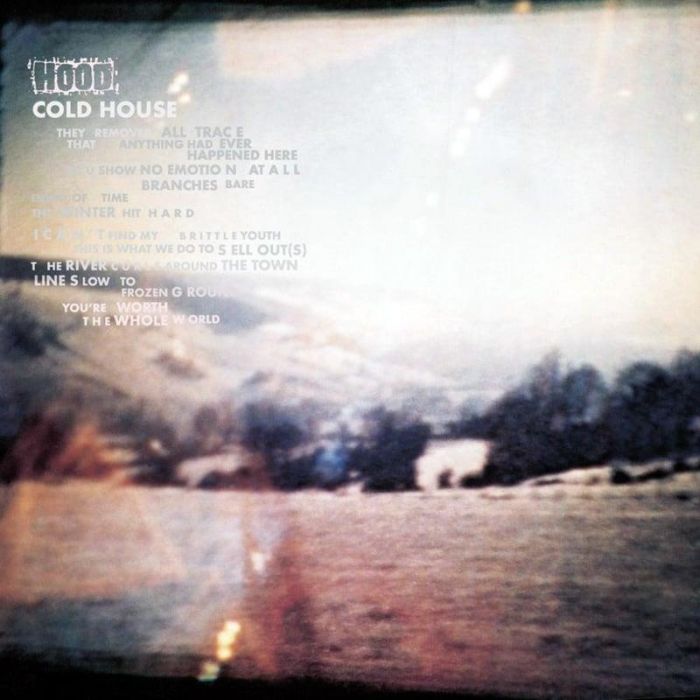Cold House by Hood (Review)

Getting into a Hood album is never an easy process. The very nature of their music, with its lo-fi background, subtle experimentation, and inherent gloominess (a trait seemingly inherited from the English countryside), seems initially resistant to any listener efforts. As much as I’ve liked Hood’s albums in the past, I’ve always felt kept at arm’s length. Rather than me absorb the album, it’s almost as if I have to wait for the album to absorb me, to grow on me like so much moss and ivy.
But as isolationist as this may be, Hood has never taken the easy route with their music. Listening to something like Rustic Houses, Forlorn Valleys, it’s easy to see how Hood could slip further and further into their gloomy, Disco Inferno-styled musings. Eventually, the music could become insular to the point of being ponderous and banal.
But then along comes Cold House, an album that finds Hood expanding on everything their previous two releases — Home Is Where It Hurts and The Cycle of Days and Seasons — only hinted at. Cold House is not necessarily an easy album to listen to; indeed, one finds it almost begrudging to admit how great this album is, because again, it holds you at arm’s length. But given the creativity and genre-twisting on display, it’s morose exterior becomes all that more inviting when compared to the narrow context that Hood’s music would seem to imply.
If you’ve never listened to Hood before, and you want to get an idea of their sound, their song titles will provide all the clues you need. Titles like “Branches Bare,” “I Can’t Find My Brittle Youth,” “The River Curls Around The Town,” and “Lines Low To The Frozen Ground” conjure up images of small, isolated villages in Northern England stuck in perpetual winter, unadorned moss-covered brick buildings standing in stark contrast to the slate grey sky. Which is why it’s so fitting (almost eerily so) that I’m listening to this album at the end of December. If there ever was such a thing as “winter music,” Hood has cornered the market.
The album opens with the skips, clicks, and glitches of “They Removed All Traces That Anything Had Happened Here.” Against this icy crackling, sparse guitar melodies slowly begin to form as a clarinet or some other broken woodwind creates a lonesome drone in the background. Eventually, the drums take up a shuffling rhythm alongside the electronic debris. Meanwhile, a vocalist sings “I know that we’re all afraid of waking every day/Promise you’ll hold on, promise you’ll hold on” with a sort of resigned air that implies it’s already too late. And then the MCs (Dose One and Why? from cLOUDDEAD/Anticon) chime in, their vocals cut-up and spliced in with the glitchwork.
And that’s just the first track. With the second track, they’ve ditched that entirely, going instead with a sort of spiralling synthpop that sounds eerily reminiscent of The Faint (minus all of the death, sex, and pretense). “The Winter Hits Hard” finds the glitchwork (think Oval’s Systemisch) completely taking over, creating sounds reminiscent of snow crunching under your boots, frost growing on windows, and icefloes scraping against eachother on the lake. And “This Is What We Do To Sell Out(s)” practically beats Aphex Twin’s Drukqs at its own game, trading soulless IDM doodlings for childhood nostalgia and longing.
But as many odd twists as Hood employs, it still doesn’t really prepare you for “You’re Worth The Whole World,” which might just be the brightest song Hood has ever written. Of course, “bright” is a relative term; this is Hood we’re talking about, after all. And even though its cut-up vocals (again, featuring Dose One and Why?) take some getting used to, they soon reveal how integral they are to the song. That being said, it’s overall tone suggests a light at the end of the tunnel, or a possible thawing (in keeping with the winter motif).
Some have compared Hood’s latest to Radiohead, even going so far as to claim they’ve beaten Thom and the boys at their own game. I don’t know if I’ll go that far (despite both bands’ forays into electronica, this never sounds like Kid A). But I’ll say this; even with all of the sampling, fractured beats, cut-up vocals, and other sonic trickery, there’s never a moment when Hood’s music doesn’t feel completely natural. Even when the music hits its most abstract points, e.g., “This Is What We Do To Sell Out(s),” it never comes off as gratuitous or manufactured.
Of course, that doesn’t make it any easier to listen to. Despite the amount of detail I can go into when describing their music, there’s always an element of frustration I’ve come to expect when listening to Hood’s efforts. It’s not some sort of smarmy elitism on their part, but more of an enigmatic quality that keeps something just out of my reach. And it’s that quality which keeps me coming back, again and again, to Hood’s music.